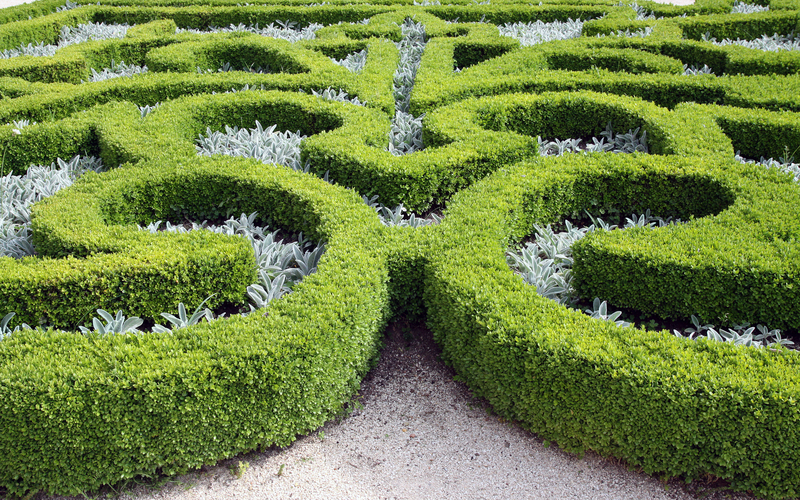Enhancing Soil Naturally with Organic Waste
Posted on 04/06/2025
Enhancing Soil Naturally with Organic Waste
Healthy, fertile soil forms the backbone of productive agriculture and thriving home gardens. In recent years, more gardeners and farmers have discovered the amazing benefits of enhancing soil naturally using organic waste. By recycling kitchen scraps, yard clippings, and other biodegradable materials, you can improve soil texture, boost nutrient content, and support a thriving ecosystem beneath your feet--all without harmful synthetic fertilizers.

What Does it Mean to Enhance Soil with Organic Waste?
The term enhancing soil naturally refers to methods that improve the quality, fertility, and biological life of soil by harnessing what nature provides: organic matter. Instead of relying on chemical fertilizers, these techniques use materials that would otherwise end up in landfills--such as fruit peels, grass clippings, coffee grounds, eggshells, and even shredded paper--to restore the soil's vital structure and nutrients. The result is a healthier plant environment and a more sustainable garden or farm.
Why Choose Natural Soil Enhancement Over Synthetic Fertilizers?
- Environmental Benefits: Using organic waste in soil improvement significantly reduces landfill waste and the carbon footprint associated with synthetic fertilizers.
- Improved Soil Structure: Natural organic matter increases soil aeration, water-holding capacity, and nutrient retention.
- Supports Biodiversity: Decomposing organic matter encourages earthworms, fungi, and other beneficial organisms, creating a lively soil ecosystem.
- Long-Term Fertility: Rather than just feeding plants, organic waste builds lasting soil health that benefits your garden for years.
Types of Organic Waste to Enhance Soil
A wide range of household and yard materials can be repurposed for soil enhancement with organic waste. When selecting materials, make sure they are biodegradable and free of chemicals.
Common Organic Materials for Soil Enrichment
- Food Scraps: Vegetable and fruit peels, coffee grounds, tea bags, eggshells, and nutshells.
- Yard Waste: Grass clippings, leaves, small branches (chopped), and plant trimmings.
- Agricultural Byproducts: Manure (from herbivores), straw, and hay.
- Paper Products: Shredded newspaper, cardboard, and paper towels (as long as they are plain and biodegradable).
What Not to Use
Avoid adding meat, dairy, oils, diseased plants, or pet waste to your organic soil enhancement efforts, as these can attract pests or contain pathogens harmful to humans and plants.
The Science Behind Organic Waste Soil Enhancement
The secret to soil enrichment with organic matter lies in decomposition. When you introduce organic waste to the soil, microbes, fungi, and insects begin breaking it down. This process releases nutrients essential for plant growth, such as nitrogen, phosphorus, and potassium. Additionally, the resulting humus binds soil particles, improving texture and structure.
Key Benefits of Organic Waste Decomposition
- Improved Nutrient Availability: Organic waste acts as a slow-release fertilizer.
- Soil Aeration and Drainage: Loose, well-structured soil prevents root rot and compaction.
- Pest and Disease Suppression: Beneficial microbes outcompete harmful pathogens.
Popular Methods for Utilizing Organic Waste to Enhance Soil
There are multiple techniques for using organic waste to improve soil naturally. Each approach has unique advantages and can be adapted to gardens of any size:
1. Composting
Composting is the classic and most comprehensive method of turning organic waste into soil-enhancing gold. By carefully layering "greens" (nitrogen-rich materials like food scraps) and "browns" (carbon-rich items like dry leaves or cardboard), you create a pile that heats up and breaks down into rich, dark compost.
- How to Compost: Build a pile or use a bin; alternate wet and dry layers; keep moist like a wrung-out sponge; turn regularly to aerate.
- Compost improves soil structure, water retention, and feeds beneficial microbes.
- Finished compost can be dug into beds, used as mulch, or made into compost tea.
2. Vermicomposting (Worm Composting)
Adding red wigglers (special composting worms) to your kitchen waste speeds up decomposition and produces exceptional worm castings. These castings are packed with nutrients and beneficial microorganisms, providing an instant boost to garden beds and potted plants.
- Use a worm bin: Layer bedding (shredded paper or leaves), add worms and kitchen scraps, and keep moist.
- Great for apartments, small spaces, or indoor use--virtually odor-free.
3. Mulching with Organic Waste
Applying a layer of organic waste mulch (leaves, grass clippings, straw) around plants helps retain moisture, suppresses weeds, and gradually enriches the soil as it breaks down.
- Best applied 2-4 inches thick, keeping away from plant stems to avoid rot.
- Requires less effort than composting and doubles as instant soil protection.
4. Trench Composting
This simple method involves digging a trench or hole, filling it with organic waste materials, and covering it back up. As it decomposes in place, the soil receives direct organic enhancement.
- Ideal for turning yard waste or kitchen scraps directly into the ground without a compost pile.
- Plan trenches in empty beds or between rows to avoid disturbing plant roots.
5. Sheet Composting ("Lasagna Gardening")
Layering organic waste, green materials, and soil on top of existing beds builds "lasagna" gardens. Over time, the layers break down in situ, creating fertile, friable soil ideal for planting.
- Begin in fall for best results--by spring, your bed is ready for planting.
- Perfect for starting new beds over lawns or compacted soils.
Step-by-Step Guide to Naturally Enhance Soil with Organic Waste
Step 1: Assess Your Soil Needs
- Is your soil sandy, clay-heavy, or low in organic matter? Identify specific areas to improve.
Step 2: Collect and Prepare Organic Waste
- Segregate kitchen scraps and yard waste in designated containers.
- Chop large items for faster decomposition.
Step 3: Choose Your Enhancement Method
- Composting, mulching, trenching, or vermicomposting--select based on your space, time, and needs.
Step 4: Apply to Soil
- Mix finished compost into planting beds, top-dress with worm castings, or mulch around established plants.
- For trench composting, dig, fill, and cover trenches or holes with waste for decomposition in place.
Step 5: Monitor and Maintain
- Check soil moisture, aerate compost piles, and replenish mulches as needed.
- Observe soil texture, plant health, and earthworm activity for signs of improvement.
Best Practices and Tips for Soil Enrichment with Organic Waste
- Balance Carbon and Nitrogen: In compost piles, aim for a balance of "greens" (nitrogen) and "browns" (carbon) for efficient breakdown.
- Avoid Over-Application: Thick, undecomposed layers of organic waste can choke out plant roots or attract pests.
- Rotate Waste Types: Use a variety of materials to prevent nutrient imbalance and maximize microbial diversity.
- Monitor for Weed Seeds: Hot composting kills most seeds; cold compost or raw mulch may introduce weeds if material is not well-rotted.
- Use Caution with Manure: Only use manure from herbivores and be sure it is well-aged to avoid high ammonia levels or pathogens.
Common Questions About Enhancing Soil Naturally with Organic Waste
How long does it take for organic waste to improve soil?
Compost is usually ready in 2-6 months, depending on temperature and materials. Mulching and trench composting enrich soil gradually over one season. Regular addition leads to continuous, cumulative improvement.
Will organic soil enhancement attract pests?
Proper composting and mulching shouldn't cause problems. Avoid meat/dairy, and bury kitchen scraps if open-trench composting to prevent rodents or flies. Well-done compost has an earthy scent and repels most pests.
Can I enhance soil with organic waste in containers?
Yes! Mix small amounts of mature compost, worm castings, or shredded leaves into potting mix. Avoid adding raw waste to pots, as it can draw flies or stunt plant growth.

The Environmental Impact: Closing the Loop with Organic Waste
Beyond the garden, using organic waste to build better soil is an eco-friendly solution to one of the planet's biggest challenges--food and yard waste disposal. Accounting for up to 30% of landfill content, organic waste decomposition produces methane, a potent greenhouse gas. Composting and natural soil enhancement not only reduce landfill waste but also foster healthier, carbon-sequestering soils.
Summary: Building Sustainable Gardens Through Natural Soil Enhancement
- Enhancing soil naturally with organic waste revitalizes soil health, plant productivity, and gardens' ecological sustainability.
- Simple composting, mulching, and direct application techniques transform kitchen and yard scraps into nourishing soil amendments.
- Implementing these methods supports biodiversity, reduces reliance on chemical fertilizers, and closes the loop on household waste.
- Embrace these practical, planet-friendly strategies for thriving gardens--and healthier plants, soils, and communities.
Begin your journey today: start collecting your organic waste, select the method that fits your garden, and transform both your soil and your environmental impact. With each banana peel and fallen leaf, you take a simple step toward richer soil and a greener future.
Latest Posts
Unleash creativity with a garden designed for young minds
Explore 9 Must-Have Ground Covers for UK Gardeners
Step-by-Step to Your Own Fresh Herb Paradise

